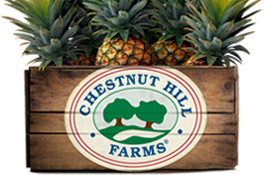Growers that cultivate pineapple often use the word “seed” for the sucker that is used for planting but this is the incorrect use of the word “seed”. Pineapples do occasionally produce true tiny black seed just below the peel of the fruit which can be found when the fruit is peeled but, in general, pineapples are highly self-incompatible (a general name for several genetic mechanisms in angiosperms, which prevent self-fertilization and thus encourage outcrossing. In plants with SI, when a pollen grain produced in a plant reaches a stigma of the same plant or another plant with a similar genotype, the process of pollen germination, pollen tube growth, ovule fertilization, and embryo development is halted at one of its stages, and consequently no seeds are produced. SI is one of the most important means to prevent selfing and promote the generation of new genotypes in plants, and it is considered as one of the causes for the spread and success of the angiosperms on the earth). Hummingbirds, when present, are the usual natural pollinators but most often when the pollen germinates on the female part of the flower known as the stigma, it usually does not grow through the style and fails to fertilize ovary. Despite this self-incompatibility the fruit will still develop because pineapples are parthenocarpic which means the fruit goes ahead and develops without fertilization of the ovary. Most fruits require fertilization for fruit development. Another example of a parthenocarpic fruit is bananas.
The tiny black seeds that can be found occasionally can be grown into a pineapple plant but it is a very slow process. I have grown them using two plastic glasses. I put soil in one glass and place the seed on top of the soil and cover them with a very thin layer of soil and then carefully moisten the soil (not to the point of saturation). I then invert the second clear plastic glass on tape it to the top of the glass with the soil to form a miniature greenhouse. After 2-3 weeks you will see very small green leaves emerging from the soil. It will take several months to obtain a plant large enough to plant into the ground or a large pot to eventually produce the fruit.
This time consuming process is the reason that commercial pineapple growers use suckers to plant in the field. In a commercial operation, after the fruit is harvested some of the axillary buds that are at the base of every leaf of the pineapple plant will begin to develop into small pineapple suckers which will be large enough to plant in the field in a couple of months. We incorrectly call these suckers “seed” they should probably really be called “daughters”.


